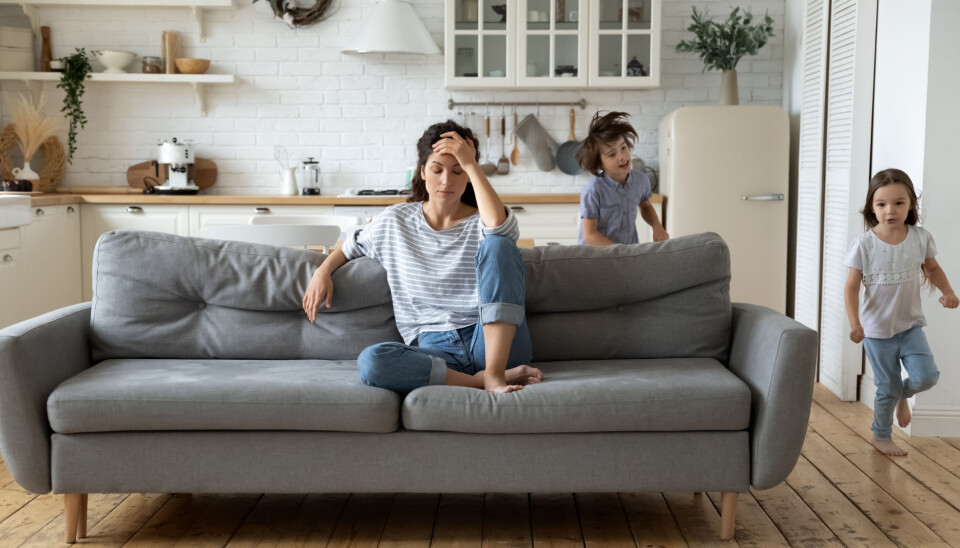
How many people actually regret having children?
Between 10 and 13 per cent of Polish parents regret having children. Single parents and those with poor finances or health problems regret having them most, new studies show. “Many probably had children when they were too young,” one Norwegian happiness researcher says.
Having children almost seems like a universal need for humans.
Only 5 per cent of women and 7 per cent of men between the ages of 18 and 40 want a life without their own children, according to a survey done by the EU.
But choosing to have children involves greater risk than many other life decisions.
“The choice is irreversible, and has lifelong consequences,” Polish researcher Konrad Piotrowski at the University of Poznan points out in a new study.
At the same time, it’s impossible to know in advance what your life will be like with your own children.
“You have no idea until you have had children. Regardless of whether you have worked with children, living with your own children will be something completely different,” he wrote.
So how many people actually regret becoming parents? Piotrowski wanted to find out.
Over two thousand parents
Piotrowski has now conducted two studies with a total of 2,500 Polish parents.
The parents in one group were between 18 and 40 years old, selected from a representative sample of the population.
The parents in the second study were between 18 and 30 years old. Many of them had had children very early.
Everyone was asked if they still would have chosen to have children if they could have gone back in time.
The analyses show that 13.6 per cent of the parents in the first group regretted that they had had children. Fully 10.7 per cent of the youngest parents regretted their decision.
One in eight parents regrets
About one in eight Polish parents regrets having children.
This is higher than the proportion in many other countries. Previous, smaller studies indicate that 7-8 per cent of parents in the United States and Germany regret having children.
These studies have been small. Larger studies that are representative of the entire population have been lacking until now.
Burned out
The Polish parents were also asked about their social status, state of health and whether they had financial problems.
The results from both Polish studies show that those who regretted having children also had poorer physical and mental health than people who didn’t regret their choice.
They were more vulnerable to social pressure and had had more negative experiences during their own childhood.
Many people experienced a strong identity crisis as parents and felt burnt out.
Bad finances
The researchers also found a connection between economic status, social status or having children with special needs.
Financial problems and being a single parent significantly increased the risk of a parent regretting the decision to have children.
Parents who regretted their decision came from different places and had different educational levels, so these factors did not seem to come into play in their regrets.
Surprising
Happiness researcher Thomas Hansen studies quality of life at the Norwegian Institute of Public Health and Norwegian Social Research (NOVA) at Oslo Metropolitan University. He is surprised by the figures from Poland.
“Few people actually regret irreversible choices. They learn to live with the life situation they have ended up in, and make the best of it,” he said to sciencenorway.no.
It’s more common to be dissatisfied with life situations that can be changed, such as dissatisfaction with your partner or work situation, he says.
“In this sense, the results of the study are surprising, that so many people regretted their choice,” he said.

More demanding to have children when young
But when you look at which groups of people regretted having children, you can see these findings are no accident.
Many are parents who had children when they were quite young, have an unstable life situation and were single parents.
“This means that opportunity costs are higher. Or that they are poorly prepared or equipped to be in the demanding role of being a parent,” Hansen said.
“If you’re a single parent, have financial problems or have children when you are quite young, your role as a parent becomes more demanding — especially in countries with poor public support schemes such as Poland,” he said.
He believes that the parents who regret their choice are most dissatisfied with the timing — that they had children too early in their lives.
“These parents' quality of life will probably improve when their children grow up, and they get their heads above water,” Hansen believes.
In general, we rarely have regrets
Hansen is not aware of any similar surveys in Norway. But in general people have few regrets about the choices we have made that can’t be undone.
Some studies have looked at childless people. Childless individuals surprising regret very little, whether they chose not to have children, or whether they waited too long to have them.
Most of us are enormously adaptable, says Hansen.
“Our quality of life is also very genetically determined. There are individual differences between how we look at our own situation and how we ‘take it’, he says.
Traumatic childhood
Parents who regretted having children were more likely to have had a traumatic childhood, marked by bullying, violence and rejection.
They also had more symptoms of anxiety and depression.
These parents were also sensitive to social evaluation and criticism. Many experienced severe burnout in their roles as parents.
Effects on children?
Regretting having become a parent can be a significant social and psychological problem, about which politicians and health services should be aware, the researchers said.
The researchers emphasize that there doesn’t have to be a causal connection between the parents' situation in life and their regrets about having had children.
Researchers should look more carefully at why people regret having children, and there should be more research on how a parent’s regret can affect their children's development.
The goal is to prevent these experiences, and provide support to people who experience it, the researchers said.
Translated by Nancy Bazilchuk
Read the Norwegian version of this article on forskning.no
Reference:
K. Piotrowski: How many parents regret having children and how it is linked to their personality and health: Two studies with national samples in Poland. PLoS ONE, July 21, 2021.































